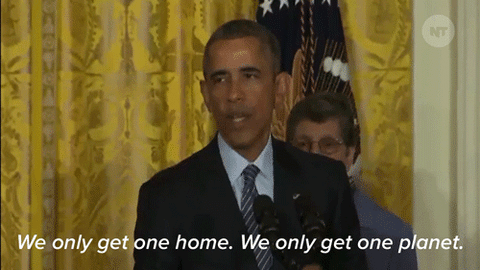Sign up to stay in the loop on new styles and sales!
Sign up to stay in the loop on new styles and sales!
Make The Environment Great Again
thinx archive
·5 min read

by Mia Abrahams | 06/06/2017
On June 1 President Donald Trump withdrew from the Paris Agreement, a historic agreement that aligns 196 countries (formerly including the world’s biggest polluter: the US) under the belief that the threat of climate change is “urgent and potentially irreversible” and promise to cut greenhouse gas emissions, invest in clean energy, and prevent the already clear effects of climate change. The ultimate goal of the agreement is to limit the rise in global temperature to 2 degrees (3.6 degrees Fahrenheit) — as a first step. (PS. NPR has a good breakdown on what the Paris Agreement actually is.)
Sooo, why is this such a big deal? Because the history of international agreements on climate change action has been long and fraught. And while President Obama devoted a whole lot of time and energy into getting the international community to come together, under our new administration it feels like we are not only at a standstill, but actively trying to turn back the clock
Sure, the decision to leave the Paris Agreement was largely symbolic---and in a nice twist, under the rules of the agreement, the Trump administration can only formally leave the pact on Nov. 4, 2020, the day after the next election---but symbols do matter. Remember, it was only eight years ago that the Republican Nominee for President, John McCain, was actively campaigning on a platform of climate change action. Don’t forget that President Obama called climate change the “greatest threat to future generations.”
Now we have a president who thinks that climate change is a Chinese hoax, who appointed a climate change denier, Scott Pruitt, to head the EPA (whose main job is to make sure Americans have clean air and water — ya know, stuff we kinda need), and who bends to the interests of powerful lobbyists like the Koch Brothers.
Surveys show that the majority of Americans in *literally every state* want to remain within the Paris Agreement, and today a Reuters poll showed that most Americans think the United States should take "aggressive action" to fight climate change.
And if that’s not enough for ya, a report by the UN showed women are, and will be, disproportionately affected by climate change, particularly in developing countries. Women are most often charged with securing water, food, and heating — and also have unequal access to resources, decision-making processes, and sometimes limited mobility. So why doesn’t gender enter into climate change discussions more often? Well, as Mother Jones pointed out in 2009, “probably partly because only seven of the world’s 150 elected national representatives are female, and female scientists make up only 15% at most of the authors of IPCC’s climate assessment reports.” So, yeah, seems about right.
It’s scary, and tbh kind of overwhelming. The US’s participation in reducing carbon emissions is crucial to the future of the planet. The science is telling us that warming is already occurring, and future effects of climate change will be devastating. According to data from the World Resources Institute, the United States was the source of 27% of the world’s carbon dioxide emissions.
How the hell are we going to get ourselves out of this? Well, here’s some good-ish news. A bunch of states (making up 30% of the US GDP), including New York, California, and the city of Pittsburgh, have reaffirmed their commitments to the guidelines of the Paris Agreement. The international community has renewed its commitment to battling climate change, and yesterday California Governor Jerry Brown met with President Xi Jinping of China to reaffirm the importance of climate change action. Citizens across the world are stepping up— as evidenced by the thousands of people who took to DC as part of the People’s Climate March.
So, if you’re feeling a bit helpless, here are 5 easy enough things you can do to contribute to climate change action. (PS — That UN report found that not only are women the most vulnerable to the effects of climate change, they can also be the most effective agents of change):
Act local
It’s easy to feel overwhelmed by the enormity of the issue of climate change, and that “nothing I do will make a difference.” But you don’t have to solve it all at once! Start small within your community. Is there a local environmental issue you can become involved in or campaign for? Charity Navigator is a good place to start looking for local orgs.
The power of choice
Environmentalism 101: shorter showers, turn off the lights when you leave a room, *don’t* leave your AC running all day (yes, even in the middle of August). But there are other everyday things we can do to reduce our impact. Eating less red meat and dairy (the production of which is incredibly carbon-intensive) can help (hey, it’s your chance to finally become a vegetarian/vegan!). Oh, and don’t throw out so much food! Scientists have estimated that up to 40% of American food is wasted (wasted food = landfill + methane + overproduction of food we don’t need!) Take public transportation whenever possible -- biking or taking the bus instead of driving to work (alone) every day will dramatically reduce your carbon output.
Don’t get wasted!
Every single thing you recycle is not only one less thing that has to be produced, it’s also one less thing that ends up in landfill. Reduce your reliance on disposable products (hint: buying a pair of THINX will help reduce your dependence on disposable, landfill-bound menstrual products). One thing I’m trying to do this year is chill on fast-fashion -- yes I *want* it, but do I really *need* it? Probably not.
Get involved
There are plenty of good organizations out there leading the way on climate change action. Donate, sign-up to newsletters, get involved with campaigns, volunteer… Earth Justice fights for climate change action in the courts (most recently, acting on behalf of the Standing Rock Sioux Tribe against the Dakota Access Pipeline) and the Environmental Defense Fund is a bipartisan organization that works with lawmakers to solve and advocate for environmental solutions. What else? Write a letter to your local Congressperson, and let them know you care about real action on climate change. And pay attention (I know, there’s a lot to think about) to the way your local representatives vote in terms of environmental policy. You know there’s an election coming up in 2018…
What things are you doing to take action on climate change? Let me know in the comments!

by Mia Abrahams


